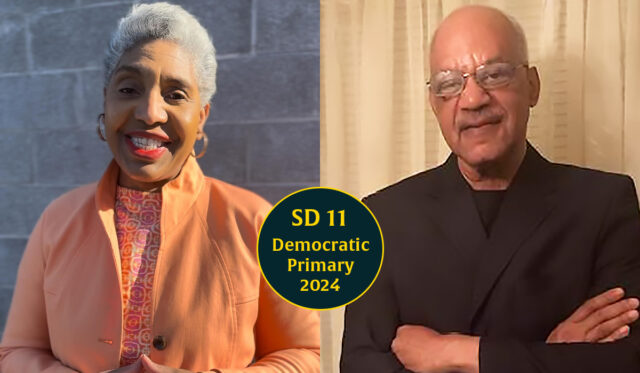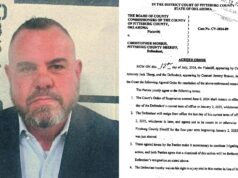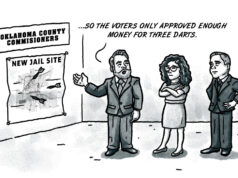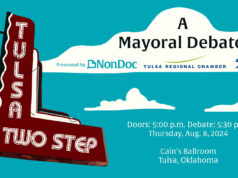
The race to replace term-limited Sen. Kevin Matthews in Oklahoma State Senate District 11 drew only a pair of Democratic candidates. One has already served nine years in the House of Representatives and could serve a single four-year Senate term before she is term limited, and the other has public service experience at the city level.
State Rep. Regina Goodwin (D-Tulsa) and former Tulsa City Councilman Joe Williams are running in the Democratic primary for Senate District 11, which encompasses downtown and north Tulsa as well as the southeastern corner of Osage County. No other candidates filed to succeed Matthews (D-Tulsa), so the winner of the primary will win the seat outright.
For the June 18 primary election, polls will be open from 7 a.m. to 7 p.m. Early voting takes place through Saturday, June 15.
After winning a 2015 special election, Goodwin has represented House District 73, which overlaps much of the area of SD 11. Williams served on the Tulsa City Council from 1994 to 2004, becoming its first Black chairman during that time.
Williams said he feels he is more “outgoing and engaged” than Goodwin is, and he said the four years she has left before she is term limited will not give her enough time to make an impact for the Senate District.
“She only can serve four years in the Senate — I can serve for 12,” Williams said. “So, she would basically be going in as a lame duck. I honestly don’t understand why she would switch (…) and start back over.”
Goodwin called Williams’ thoughts “ludicrous” and said she has built relationships over the last nine years in all parts of the State Capitol while her opponent has never served in the Legislature.
“He has no experience there, so he would be starting at ground zero,” Goodwin said. “I think the people will [be] better served with someone who has experience, and if I were to transition to the Senate side, I don’t think I consider that starting ground zero. I think that’s nine years of my life that I think have helped me to grow and to not only grow but to be effective in the seat.”
Senate District 11 candidates talk issues
Goodwin said she had always planned on making another run for the Senate after losing to Matthews in a 2015 special election when he jumped from HD 73 to SD 11. (Months later, Goodwin bested Williams to finish atop a seven-way, winner-take-all special election for HD 73, prevailing with 35 percent of the vote compared to Williams’ third-place finish of 20 percent.)
“I’ve always said when the (Senate) seat opened up, then I would run for it again. I’m running for it because I’m qualified to run for it,” Goodwin said. “I’m running for it because I have people that I know at the Capitol — we’ve passed legislation — and it’s just a transition, but however, so much work remains, and that’s why I’m running for the Senate seat.”
Williams does not have a campaign website or social media page, but he said he has been sending potential voters a two-minute video outlining his priorities. In an interview, he said those priorities include criminal justice reform, increased access to health care and smaller class sizes in public education. He also said he wants to increase the number of small businesses in the north Tulsa district.
“District 11 is a high-poverty area, and I think that the best way to revitalize it is to create and grow more small businesses,” Williams said.
To do that, Williams said he wants to find ways to provide “capital and tax incentives” to encourage economic growth for the rural and urban parts of the district, which has significant housing, food and retail needs despite vast tracts of vacant land and empty storefronts.
“The issues that are important to our community are economic empowerment,” Williams said in his campaign video, which he sent to NonDoc. “We need our small businesses to grow, and we need to create new small businesses and give them the opportunity through capital investments to thrive and grow and to bring jobs to our community.”
Goodwin also notes economic development among the issues important to her, and she said she wants to address criminal justice reform, health care access inequalities and voting rights. She also mentioned the budget shortfalls the state faced during her early years in office.
“Whether you’re in the Senate or whether you’re in the House of Representatives, if you care about people and if you’re compassionate, and you understand the great needs that we have throughout the state of Oklahoma, the work remains pretty much the same,” Goodwin said. “We have more money now in the Capitol than when I first arrived, and so there have been some changes in terms of priorities there at the Capitol.”
Goodwin said that Democrats, through their push in 2017 and 2018 to pass a massive revenue package to fund increased teacher salaries and other core services, are responsible for the state’s better financial situation. Now, she said that should be leveraged for more economic development in the state.
“Now they’re literally trying to look at how [economic development] can be enhanced — not just for big business, but for smaller businesses,” Goodwin said. “So, you see some shifts just because we have more money in the coffers, quite frankly, thanks to the Democrats who insisted that the oil and gas industry pay more on the gross production tax.”
Among his other ideas, Williams said he wants to see the expansion of services such as Medicaid and said he would try to facilitate a better relationship between the police and north Tulsa through “community-based policing.” He also said he would prioritize constituent services if elected.
“[Something that] was very important to me when I was a city councilman was the importance of constituent services,” Williams said. “I’ve seen people who try to call city hall, and they couldn’t get anything done, and then by the time they called me, they were at their wit’s end. I would always tell my constituents, ‘Call me early.'”





















